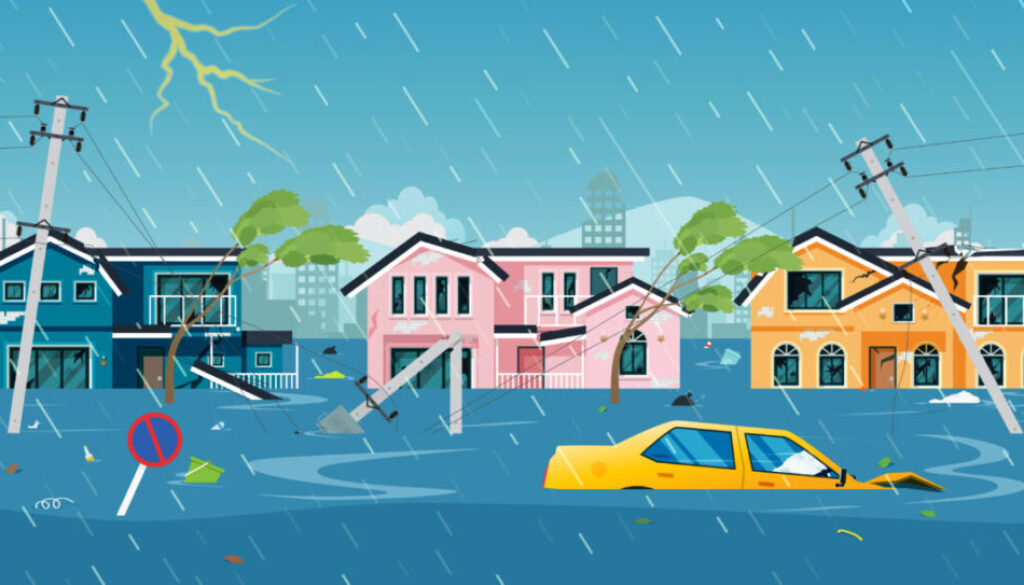National Flood Insurance Program set to expire as shutdown looms

Along with a government shutdown looming, the National Flood Insurance Program (NFIP) is also set to expire tomorrow (Sept. 30) unless Congress extends it. Run by FEMA, the program covers more than 4.7 million American policyholders and is the backbone of the nation’s flood risk management system. If lawmakers let the program lapse, the effects will reach beyond insurance, affecting real estate markets, disaster recovery, and household financial security as climate-driven disasters intensify.
The NFIP has filled a gap left by the private market. Flooding is one of the most frequent and costly natural disasters in the US, yet many private insurers have been reluctant to offer coverage because of the catastrophic risk. FEMA’s program ensures that homeowners, renters, and businesses in flood-prone areas can get policies that might otherwise be unavailable or unaffordable.
Industry experts warn that losing the NFIP, even briefly, would undercut federal protections precisely when they are needed most.
Consequences of inaction
The consequences of inaction would be immediate:
- No new policies would be issued, and existing policies could not be renewed.
- Real estate transactions in floodplains—where federally backed insurance is required—would halt, freezing parts of the housing market.
- Existing coverage stays valid only until the end of its one-year term.
- FEMA’s borrowing authority from the U.S. Treasury would shrink from $30.425 billion to just $1 billion, drastically limiting its ability to pay claims after a major hurricane or flood.
For millions of households, that means sudden exposure to uninsured risk. For mortgage lenders and real estate professionals, it could mean stalled transactions and lower property values. For FEMA, it would mean the risk of insolvency after a single large storm.
Program has survived through short-term extensions
This is not the first time the National Flood Insurance Program has faced a last-minute showdown. Since 2017, the program has survived through a series of short-term extensions, often passed amid government shutdown threats or budget battles. Each September deadline has created uncertainty for insurers, homeowners, and communities struggling to prepare for disasters.
Jordan Haedtler, spokesperson for the Insurance Fairness Project, summed up the frustration: “For years now, dysfunction in meeting September 30 deadlines has created uncertainty for NFIP and delays in disaster relief just as disaster season is intensifying,” he said. “Federal cuts to FEMA and NOAA have already inflicted huge costs on communities and threatened the availability of insurance throughout the country. A lapse in the NFIP would make our climate-driven insurance and housing affordability crisis even worse.”
The NFIP debate comes amid a broader insurance affordability crisis. Private carriers are retreating from high-risk markets in Florida, California, Louisiana, and elsewhere, citing worsening catastrophe losses. State regulators are scrambling to stabilize markets as federal disaster budgets face repeated cuts.
Congressional inaction on the National Flood Insurance Program could worsen the crisis by undermining confidence in the government’s ability to backstop disaster risk. That could put more pressure on already strained state residual markets and taxpayer-funded disaster aid.
Policymakers are divided
At the same time, policymakers are still divided on how to reform the program. Long-standing proposals include:
- Updating flood maps to reflect today’s climate risks.
- Improving mitigation incentives for communities.
- Reducing subsidies that critics say mask the actual cost of living in floodplains
- Addressing the program’s mounting debt, which exceeded $20 billion before Congress forgave a part in 2017.
Each reform attempt has faced political headwinds, leaving the NFIP reliant on temporary lifelines.
Congress has historically acted right before a shutdown to revise the NFIP so that it does not correspond with the continuing resolution budget. deadline. That’s what happened during the shutdowns that occurred during Pres. Trump’s first term.
This time, though, a government shutdown appears likely given the stalemate over the CR.
“Congress usually aligns the Flood Insurance Program with the deadline for the continuing resolution,” Haedtler said. “But in several instances, including during the shutdowns that took place in 2018 and 2019 during Trump’s first term, they actually extended the Flood Insurance Program deadline to not correspond with the continuing resolution (CR), and they could do that again so that there’s not a lapse, even if the government shuts down.”
Headaches. reputational risks for insurers
For the insurance industry, an NFIP lapse would create operational headaches and reputational risks. Agents would be unable to write or renew policies, leaving them to explain to customers why federally needed coverage is suddenly unavailable. For financial institutions, it would mean delays in closing loans in flood zones, adding uncertainty to the housing market.
For FEMA, the risk is even more severe. With borrowing authority capped at $1 billion, a single catastrophic event—such as a Category 4 hurricane hitting the Gulf Coast—could leave the agency unable to pay claims, forcing it to wait for congressional appropriations.
As the deadline approaches, the NFIP once again finds itself at the intersection of climate risk, insurance market stability, and partisan gridlock. While few lawmakers want to see the program lapse, broader fights over budget caps, disaster spending, and FEMA’s future could complicate renewal.
The stakes are high: a lapse would jeopardize financial security for millions of families, stall real estate transactions, and weaken the nation’s disaster safety net at a time of mounting climate threats.
Whether Congress can move past short-term fixes and deliver a longer-term reauthorization—or whether the NFIP becomes another casualty of budget brinkmanship—remains to be seen.
© Entire contents copyright 2025 by InsuranceNewsNet.com Inc. All rights reserved. No part of this article may be reprinted without the expressed written consent from InsuranceNewsNet.com.
The post National Flood Insurance Program set to expire as shutdown looms appeared first on Insurance News | InsuranceNewsNet.





